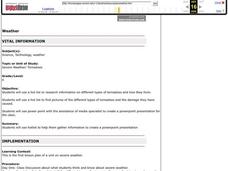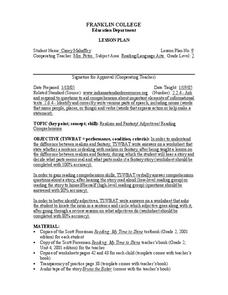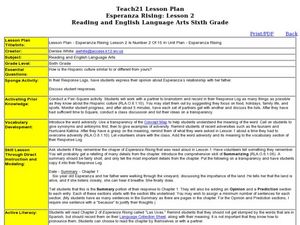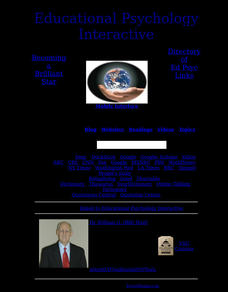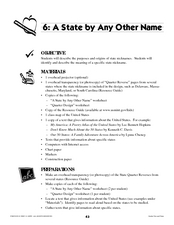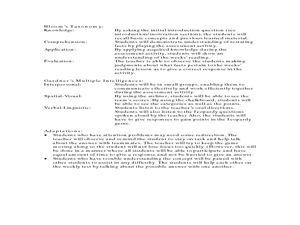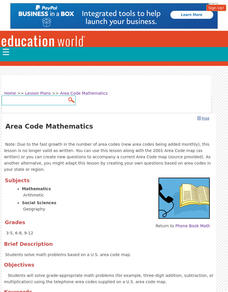Curated OER
Weather
Sixth graders hear the book "Tornadoes" by Peter Murray, they use a hot list to research information on tornadoes. Then they create a group PowerPoint on the information they have gained on their research. They share these PowerPoint...
Curated OER
A Month of Mapping Literature
Explore the world through literature! With push pins to mark where each story came from, learners examine cultural differences, geographical location, and how those elements affect story content. This lesson could use deeper development,...
Curated OER
Realism and Fantasy
Second graders listen to the story, Bruno the Baker, where some parts seem real and some seem fake. They must identify the parts of the story as realism or fantasy. An interesting way to teach young readers these two concepts.
Curated OER
The Sounds of Daydream
Based on the poem "The Lake Isle of Innisfree" by Irish poet William Butler Yeats, this resource is well constructed and guides learners through examining the Yeats poem (rhyme, meter, content) to composing a poem of their own about a...
Curated OER
Measurement: Cylinders
Math scholars observe and demonstrate how to calculate the surface area and volume of cylinders. They analyze pictures of various cylinders on a handout, solve problems on two worksheets independently, and discuss the answers to the...
Curated OER
Esperanza Rising: Lesson 2
Sixth graders explore adversity. In this summarizing lesson students compare their culture to the Hispanic culture. Students reflect on a time they were met with adversity. Students summarize Chapter 1 of Esperanza Rising.
Curated OER
Paragraph Unity
Your class can construct a well-written paragraph. They utilize a sequential method which assists them in formulating a concise expository piece. The paragraph must contain a topic sentence, five supporting sentences, and a conclusion.
Curated OER
Poetry in Song
Have your music lovers examine song lyrics and identify the poetry elements or tools used by a lyricist. They review the song individually before working in groups to discuss what they discovered about the song's narrator or character...
Curated OER
A State By Any Other Name
Learning about the fifty states can be motivating. After listening to books, pupils discuss and learn about the nicknames of various states. This is an interesting way to review the locations and characteristics of the states.
Curated OER
Exploring the Hudson in 1609
Learners follow the journey of Henry Hudson down the river with his name. Using journal entries and maps, they learn about its exploration. They use maps to identify stages of the journey, and practice converting distances into miles.
Curated OER
Living Amendments to Our Constitution
Students review the articles of the Constitution and identify the amendments to the Constitution. They use the skills of analysis and synthesis in matching the present day situation with the correct Amendment that applies.
Curated OER
Outlining Main Ideas and Details
Begin at the end. Present your class with an expository essay and ask them to create an outline of the article, paying particular attention to the main ideas and the details supporting these ideas. After a discussion of what they have...
Curated OER
Finding Equations
Students make equations from everyday data. They create a graph from the equations. Students predict and analyze the results. Students complete the second scenario on their own and turn in their handout.
Curated OER
Expressions and Equations
Develop understanding of algebraic expressions and equations by having your class define examples of each. The class discusses how parentheses affect the order of operations and learn how to solve for x. A variety of examples are used.
Curated OER
A Feat of Daring with Lewis and Clark Jeopardy
Sixth graders discover the exploration of the United States by participating in a class activity. For this U.S. History lesson, 6th graders research the Lewis and Clark expedition and participate in a game of Jeopardy based on the two...
Curated OER
Beauty Is Skin Deep
Students reflect upon the the experiences of superficial comments based upon physical appearance. The expectations of others is discussed in class. Also the influences of media is stressed and its expectations are demonstrated as either...
Curated OER
Number Operations
Fourth graders examine the relationship between multiplication and division and subtraction and division, and determine which operation is needed to solve various problems. They observe and participate in a teacher-led lecture, and...
Curated OER
The Wall Inspires Letters to Veterans
Learners examine the Vietnam war. They listen to and discuss the book, "The Wall," by Eve Bunting, conduct Internet research, and write a letter or send a card to U.S. military veterans in a local Veteran's Hospital.
Curated OER
Archaeological Detectives
Students, in groups, examine in depth one aspect of forensic archaeology to determine the skeleton's age, gender, and possible cause of death. To do so, students must first explain what is involved in each aspect of forensic archaeology.
Curated OER
Inventing Insects
Students explore the world of insects and discover what it might be like to live like one. They create an insect with physical characteristics and demonstrate how it moves. Students also compare and contrast insects to spiders and how...
Curated OER
Watershed Tourist
Students recognize and categorize different bodies of water. In this watershed and water environments lesson, students "Follow the Water from Brook to Ocean." Students define the different bodies of water and sort from smallest to...
Curated OER
Picture This: Visualization
Sixth graders practice visualizing and understanding that visualization is an important comprehension strategy. They share their visualization of the story through original artwork and determine that ideas, and cultural settings can...
Curated OER
Using Words to Work Things Out
Students recognize a problem and how to resolve it. In this lesson, students listen to The Hating Book and discuss the events of the story. Students answer comprehension questions and relate to their own experiences. Students role play...


